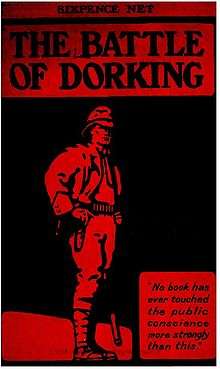The Battle of Dorking
The Battle of Dorking: Reminiscences of a Volunteer is an 1871 novella by George Tomkyns Chesney, starting the genre of invasion literature and an important precursor of science fiction. Written just after the Prussian victory in the Franco-Prussian War, it describes an invasion of Britain by a German-speaking country referred to in oblique terms as The Other Power or The Enemy.
 Cover of the 1914 edition | |
| Author | George Tomkyns Chesney |
|---|---|
| Country | United Kingdom |
| Language | English |
| Genre | Invasion literature |
| Publisher | Lippincott, Grambo & Co (reprint Oxford Press 1971) |
Publication date | 1871 |
| Media type | Print (hardcover & paperback) |
| ISBN | 0-19-283285-9 |
Background
Chesney was a captain in the Royal Engineers and had grown concerned over the ramshackle state of Britain's armed forces. He used fiction as a device to promote his views after letters and journalism on the issue had failed to impress public opinion. The Franco-Prussian War (1870–1871) had just demonstrated the speed, superiority and adaptability of the Prussian Army, which meant that Chesney's depiction of a fast-moving and determined invader hit a nerve.[1]
Plot
The story is told as a narrative by an unnamed veteran who participated in the Battle of Dorking. He is recounting the final days before and during the invasion of Britain. It is addressed to his grandchildren as an event fifty years earlier. Beginning sometime after an event similar to the Franco-Prussian War, concerns grow with the mobilisation of armed forces near the Netherlands. The Royal Navy is destroyed by a wonder-weapon ("fatal engines"), and an invasion force suddenly lands near Worthing, Sussex.
Demilitarisation and lack of training means that the army is forced to mobilise auxiliary units from the general public, led by ineffective and inexperienced officers. The two armies converge outside Dorking, Surrey, where the British line is cut through by the advancing enemy and the survivors on the British side are forced to flee.[2]
The story ends with the conquest of Britain and its conversion into a heavily-taxed province of the invading empire. The British Empire is broken up, with only Gibraltar and Malta being kept by the victorious Germans. Canada and the West Indies are ceded to the United States, and Australia, India and Ireland are all granted independence. Ireland enters a lengthy civil war as a result.[2]
Publication history
.jpg)
The Battle of Dorking was first published as a serial in Blackwood's Magazine, then in pamphlet form before finally appearing as a novel. It went through several editions and engaged the interest of soldiers and politicians, as well as the reading public.
It has appeared in a number of collections, including Michael Moorcock's Before Armageddon: An Anthology of Victorian and Edwardian Imaginative Fiction Published Before 1914 (1975).
The pamphlet is in the public domain, an on-line edition can be found here http://gutenberg.net.au/ebooks06/0602091h.html or here : https://archive.org/details/battleofdorking00chesrich/page/n3
References
- Ashley 2011, p. 84.
- Chesney 1871, pp. 1–102.
Sources
- Ashley, M. (2011). Out of This World: Science Fiction, but Not as You Know It. London: British Library. ISBN 978-0-7123-5835-4.CS1 maint: ref=harv (link)
- Chesney, G. T. (May 1871). "The Battle of Dorking". Blackwood's. London. ISSN 0006-436X. Retrieved 14 January 2019.CS1 maint: ref=harv (link)
Further reading
- Clarke, I. F., ed. (1995). The Tale of the Next Great War 1871–1914: Fictions of Future Warfare and of Battles Still-to-come. Liverpool Science Fiction Texts & Studies (1st ed.). Liverpool University Press. ISBN 978-0-85323-469-2.
- Clarke, I. F. (March 1997). "Before and After The Battle of Dorking". Science Fiction Studies. Part 1. ISSN 0091-7729.
- Kirkwood, Patrick M. (Fall 2012). "The Impact of Fiction on Public Debate in Late Victorian Britain: The Battle of Dorking and the 'Lost Career' of Sir George Tomkyns Chesney". The Graduate History Review. 4 (1). pp. 1–16. ISSN 1925-2455. (Kirkwood notes that Surrey was also to be the scene of the invasion in H. G. Wells' science fiction novel, The War of the Worlds (1898), whose alien invaders landed near Woking.)